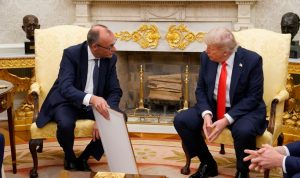German Chancellor Friedrich Merz can be unpredictable with a microphone in his face.
German Chancellor Friedrich Merz was clearly feeling quite comfortable last week as he chatted on German public broadcaster WDR about his recent conversations with Donald Trump. He mimicked the U.S. president’s praise for Chicago – "a really great city" – and went on to say that every second or third word out of Trump’s mouth is "great." The chancellor seemed quite pleased with himself.
It was the kind of chitchat one could find refreshingly entertaining. Or concerning. Merz is currently striving to develop a decent relationship with Trump and, together with other European leaders, seeking to prevent him from suspending U.S. military backing for Ukraine. Furthermore, the European Union is hoping to strike a tariff deal with Trump this week.
And despite all that, the German chancellor mimics the moody U.S. president on public television?
During his stint as leader of the German opposition, Merz developed a reputation for shooting from the hip. He triggered a multi-week debate when he complained about "little pashas” with migration backgrounds, for example. And he had to eat crow after a summer interview in which he seemed to suggest that working with the far-right Alternative for Germany (AfD) party might be acceptable at the local level. Ill-considered bon mots were always part of the deal with Merz.
Now, though, Merz is chancellor. He is no longer just acting on the national stage. In his initial weeks in the Chancellery, he has prioritized foreign policy and has thrust himself into the role of Germany’s senior-most diplomat. Merz has to realize that international diplomacy follows a different set of rules than domestic policy debates. In foreign relations, every word carries weight. Every gesture. Small missteps can ruffle feathers and have broad international implications.
The article you are reading originally appeared in German in issue 23/2025 (May 31st, 2025) of DER SPIEGEL.
Merz, though, doesn’t seem to be sufficiently aware of the impact of his words.
That became apparent just a few weeks before he was sworn into office. On a televised talk show, he was speaking about possible deliveries to Ukraine of long-range ballistic missiles. And he said that the destruction of the Kerch Bridge – the strategically important land link between Russia and the Russian-occupied Crimea Peninsula – would "give Ukraine a leg up.” Here was the future German chancellor providing advice on how to attack Russia. It was a comment that likely made a diplomat or two break out in a cold sweat.
Last Monday, during the aforementioned interview on WDR, Merz then declared that there would no longer be any range restrictions for weapons supplied to Ukraine. Ukraine, he said, could now defend itself by attacking military positions inside Russia. Newswires immediately picked up on the comment and sent it around the world as breaking news. Whether that was Merz’s intention, however, seems doubtful.
After all, it was a confusing comment. In contrast to its allies, Germany has thus far refrained from supplying any weapons to Ukraine that could reach targets on Russian territory. What, then, was Merz talking about? It was only two days later, during a visit of Ukrainian President Volodymyr Zelenskyy in Berlin, that the riddle was solved: Germany intends, in the future, to help Ukraine develop long-range weapons systems of its own – and for these weapons, there would be no range restrictions. Merz, though, was apparently not yet able to speak about those plans during his Monday interview. Why, then, didn’t he avoid the subject entirely?
Merz’s spontaneous style, which sometimes leads to comments that have not been carefully considered, is a mixed bag. It is a trait that clearly differentiates him from his predecessor Olaf Scholz, whose terse, sententious comments full of polit-speak earned him plenty of derision, and who was particularly careful in discussing Ukraine out of fear of triggering an escalation.
Merz clearly wishes to define himself as a more emotional leader who speaks directly and doesn’t always follow the script. Domestically, such a style has plenty of advantages: It makes him seem more approachable, more tangible, and it may even counteract widespread disenchantment with politics. But when it comes to foreign policy, it is risky. In part because Merz’s full-throated proclamations raise expectations that he cannot fulfill.
Still today, there has been no "massive" ramping up of sanctions with which Merz had threatened Russian President Vladimir Putin if he refused to consent to a 30-day ceasefire. Merz has managed to get the most important European countries to start speaking with a single voice on Ukraine. But it seems as though he has promised too much.
It would, of course, help nobody were the chancellor to become a policy robot hiding behind focus-grouped formulations. But as the country’s top diplomat, Merz must constantly consider the effect that each and every one of his words might have. There is a lot at stake.







